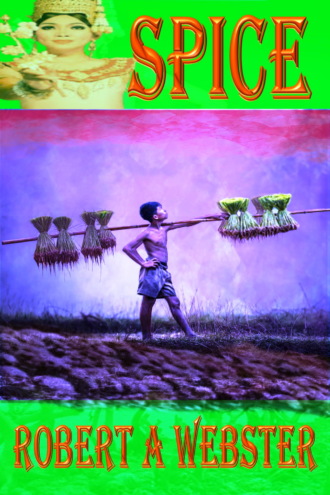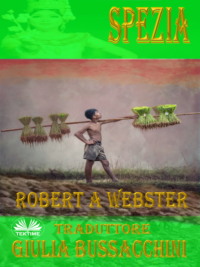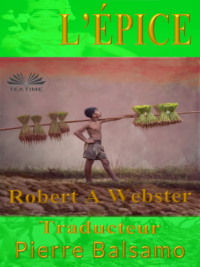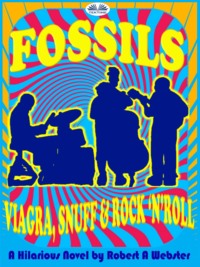
Полная версия
Spice
Two Khmer Rouge soldiers remained. Ravuth watched as they dragged Dara’s corpse from the communal hut and dumped it with the four others. Taking a can of gasoline from the generator shack, they doused a little over several of the shacks and the corpses. They giggled as they ignited the incendiary, setting fire to several huts and incinerating the bodies. These merciless, ruthless killers were teenage children, who showed neither emotion nor remorse. One soldier, having fun beating the heads of the burning corpses with a stick, looked up and saw movement in the jungle. He shouted to his comrade, who grabbed his rifle, and ran towards Ravuth’s hiding place and stopped.
“You imagined it. There’s nobody here,” said the youth.
“I’m sure I saw someone,” said the other, sounding indignant.
“Do you want to go further into the jungle and look?”
“Not likely. I don’t know what’s in there, maybe a wild animal. Come on let’s get back and catch up with the others.”
“Okay. Because you’re afraid, we will go,” mocked the other youth. They turned and ran back through the village and onto the track.
Ravuth trembled. He backed his way further into the thick foliage. The Khmer Rouge had been standing only inches from his face.
Ravuth returned to the village at sunset. He had been too afraid to move throughout the long, hot, humid day. Dazed and confused, he walked into the deserted village. Passing the smouldering corpses, he made his way to his home. Although the Khmer Rouge had burnt down some shacks and the communal hut, they had left his hut relatively unscathed. He went inside but nothing remained, having either been ransacked or took by his parents. Ravuth crouched down and wept. He stayed there throughout the night, wondering what had happened and what to do. Daybreak came, and as the room got lighter he saw the banana leaf box sticking out of a hole in a floorboard in a corner of the room. He realised that his parents must have been trying to hide it from the Khmer Rouge. He took the box and opened it. The strange plant was inside, along with a few small trinkets underneath the photographs of his family. He took out the photos and with tears in his eyes, stroked the individual images, wondering what was happening to them.
Ravuth felt alone, afraid and confused. He replaced the photographs in the box, left the hut, and wandered around the village searching for food, water, or useful items left behind. Passing the grisly remains, he went from hut to hut, scavenging and collecting anything useful. He found a machete, ate, and drank a little water. Wrapping food in a banana leaf, he collected water from rain-catching containers and filled gourds. His knowledge of edible plants and sources of fluid would assure his survival in the jungle terrain. Taking the box, machete, and other items he had found, Ravuth walked through the village and along the track that led to the road to Koh Kong.
Ravuth had been walking along the jungle track for two hours. He had trekked this route several times with his brother and father, but once Tu went onto the road along with the other villagers and rode away, the brothers would return to the village. He left the jungle, went to the unfamiliar road, and walked along the verges in case he came across any Khmer Rouge patrols. His long walk into the outskirts of town was uneventful, seeing neither traffic nor people. He saw several wooden homes along the roadside destroyed and plundered.
Making his way to the outskirts of Koh Kong town, Ravuth headed toward the town centre, which felt eerie without people. He continued for a few kilometres until he reached the border patrol hut. He hid behind the hut after seeing Khmer Rouge sitting against a newly constructed fence covering the border into Thailand.
The child soldiers lifeless features put a renewed fear into Ravuth. He crept away from the border post and walked back into the deserted town centre. Ravuth went inside a small abandoned café and replenished his food and water from the small scraps that remained. He sat and pondered his situation.
Night fell and Ravuth had still not figured out what to do. He heard a vehicle approaching. Terrified, he hid under a table as an old truck stopped in front of the café. Six Khmer Rouge came in and sat at a table.
Quaking with fear, Ravuth remained motionless as the young soldiers started up a small generator to illuminate the café and sat down. Ravuth trembled as he hid under a table in a dark corner of the café.
One soldier brought in several bottles of Mekong whisky and they drank.
Ravuth listened while the young Khmer Rouge bragged about their daily atrocities, who they had slaughtered, and descriptive details about how they did it. They spoke of their spoils of war and what items they had pilfered. One of them said something that Ravuth wanted to hear.
“My group went straight to *Choeung Ek, but we picked out the ones who will make young Khmer Rouge citizens and good fighting comrades,” he said.
“We rounded up four groups today, they went to the Koh Kong province commune to swell our ranks,” said another.
“Most of ours were undesirable old folk, so we disposed of them,” said a third, adding, “But we had fun re-educating them.” He grinned and showed the others his bloodstained machete.
The gruesome details between the boys went on for a short while; Ravuth then heard their voices slurring, and childish giggling as the strong whisky soon took effect on the youngsters.
Thirty minutes later, the Khmer Rouge staggered out of the café, got back into the vehicle, and it screeched away.
Ravuth came out from under the table. The lights were on, so he looked around the now silent cafe for any information on Koh Kong commune and Choeung Ek. He knew of neither, and unable to read or write, he found leaflets with pictures, which he placed into his box.
Staying in the cafe overnight, early the following morning, Ravuth trekked out of Koh Kong town and headed back to his jungle village to await his family. He didn’t realise he was followed until he neared a road outside Koh Kong and a voice behind him hollered, “You… Stop there!”
He turned around and a young Khmer Rouge girl pointed an automatic pistol at him as she tried to balance on the crossbar of a bicycle. “Come here!” she snapped.
Ravuth approached the grimy-faced girl who glared at him. Although she looked younger and smaller than Ravuth, looking into her eyes sent a cold chill down his spine.
“Why are you not with the others? Where is your village?” she snapped
Ravuth trembled, and with his hands together, pleaded, “I’m very sorry, I was left behind.”
The girl glared at Ravuth. “Follow me,” she snapped and got off her bike to turn it around.
Ravuth felt terrified and saw four more Khmer Rouge approaching on bicycles. He panicked, took the machete from his waistband, and hacked at the girl’s arm with all his might. The girl could not react to protect herself as she struggled with the bicycle’s handlebars. She squealed in pain as the blade tore deep into her flesh, hitting bone. She dropped the pistol and Ravuth pushed her away from the bicycle, stuffed his machete into his waistband, got on her bike, and peddled across hardened paddy fields. Heading towards the Cardamom Mountains and the safety of the jungle, bullets whistled past him as he peddled for his life.
Peddling for what seemed like an eternity, and no longer hearing gunshots, Ravuth stopped at the outskirts of the jungle, pushed the bike into the foliage, and hid behind a clump of trees. He peered out to see if he could see his pursuers. Ravuth saw four small dots in the distance, still heading towards him. He had a good head start but knew that he must get to safety within the dense foliage. Ravuth ran through the jungle, finding small tracks that he followed until he got into thick, rugged, impassable terrain.
‘They would never find me now,’ he thought and ran into the dense undergrowth.
Exhausted, Ravuth had been running through this unfamiliar section of the jungle for over three hours. Coming into a clearing with a thick treetop canopy and a little light penetrating through, he hid there, knowing he would be safe and could spot any pursuers, he sat at the base of a giant Dipterocarp tree on the lookout.
Ravuth stayed there for two days, living off the bountiful vegetation surrounding him. Realising that he had eluded his pursuers, he tried to find his village.
Ravuth felt safe in the jungle and trekked throughout the night while the moon shone overhead. He rested throughout the hot, humid days, trapping and foraging early evening until sunset.
Without directions to follow, unlike around his village, where he knew most of the tracks, trails, and familiar vegetation, he was lost. On the dawn of the tenth day, he came out from behind a row of trees onto flat open ground. An embankment dropped into a shallow valley, where he saw a large corral, surrounded by a wire mesh fence.
There were several rows of canvas bivouacs, along with a few military field canvas tents ranging in size. Ravuth saw people ambling around behind the fence; some groups were cooking on open wood fires. Ravuth could smell the aromas of Cambodian food, which made his mouth water.
‘This must be one of the places that the Khmer Rouge had been talking about. I wonder if my family’s here?’ he thought. Creeping around the wire mesh fence, he watched the camp’s inhabitants until reaching a gated area at the front. Ravuth felt exposed in the open, so he hid in a dark corner and observed.
Ravuth saw several military vehicles and soldiers come and go throughout the day. He noticed that the military personnel were not Khmer Rouge. They were older and dressed in camouflage uniforms. He went back and forth along the perimeter fence, watching the goings-on within the camp. He occasionally clambered back up the embankment to get a better view from the jungle but could see none of his family or his fellow villagers. Night fell, so he edged his way along the fence, found a clear spot, and using his hands, dug a small trench underneath the wire fence. He pulled himself through and crept towards the closest tent. Ravuth crouched down, looked ahead, picked out a spot and...
“Who are you?” said a man’s voice behind him in an unfamiliar language, “stand up, and turn around.”
Ravuth, enveloped in bright light from behind him and feeling terrified because he was unable to understand the man's instruction, he instinctively stood, spun around, and became dazzled by the light.
*Appendix
-Chapter Two-
The Baking Phenomenon
“The Baker of the Year Award goes to...,” the master of ceremonies announced and paused for effect as he glanced at the name written on the back of a gold-coloured card. “For the third consecutive year,” he faced the audience and smiled. “The pâtissier representing the Avalon Hotel,” he again paused and announced, “Mr Ben Bakewell!”
He applauded along with the audience in the plush Park Lane Hilton conference suite. Many cheered while a few mumbled as a man in an ill-fitting suit sauntered towards the stage.
“Well done Cake,” said the M.C. as the baker stepped onto the platform and shook his hand.
Although Cake had won this prestigious award three years in succession, he still felt awkward as he held up the small crystal effigy. His acceptance speech echoed those from previous years. “Thanks,” he mumbled into the microphone, blushed, farted, left the stage, and rushed over to the table to join his colleagues.
The awards ceremony was almost over, much to the relief of Cake. Several food critics were on the stage discussing the various dishes that won prizes. Cake loathed these events and considered the food critics’ idiots, incapable of boiling an egg and they didn’t belong in the industry. Even though he always received rave reviews from them. One described his *Avalon Nest Egg to be an explosion of flawless flavours creating an oral orgasm and said every dish Cake created tasted perfect.
However, Cake always felt they were average and considered his food lacked something, but unable to figure out what it was.
Cake arrived home at around 11:00 pm, after a long commute through the capital city. Jade had already arrived back from her five-day jaunt to Lincoln. Cake, excited to see her, wanted to find out how their bakery was progressing. He flopped into an easy chair in the living room while Jade fetched him a glass of wine, and they got cosy. He handed her the cheque for winning the competition and she smiled and showed him video footage of the work in progress.
Benjamin Bakewell, known as Cake for as long as he could remember, had an impeccable reputation within the culinary world. Every top chef and high-end dining establishment knew of Cake. He had held the top position as head pâtissier at the Avalon for three years. His signature cakes and pastries were the envy of every top chef, and not only unique in their preparation but also difficult to replicate. Many tried, but failed.
Cake was born on the outskirts of Louth, Lincolnshire, a rural farming town, forty-kilometres from Lincoln City. His family owned a 200-acre arable farm on the small town’s fringes, growing wheat, barley, and hops. His nickname, Cake, was because of his surname, Bakewell, and for his love of baking. He attended Grimoldby Primary School and while the other kids used their break time playing sport and recreation, he would be in the school canteen helping the school cooks.
Cake’s parents always knew he had an unusual sense. He could detect every ingredient of any dish and would add components he considered the dish lacking to enhance and elevate its flavour until his perfect palate found it acceptable. Cake would not eat nor handle meat, as the smell contained no fragrant aromas, and the texture felt grainy and rough, and the taste made him vomit. He tolerated certain seafood, but only if it was fresh and mildly flavoured, such as monkfish or scallops, to which he could add herbs and spices to disguise its fishy smell and taste. Nobody could understand this boy’s unusual gift, and it would be many years before anyone discovered the reason for his heightened sense of taste and smell. Only Cake could perceive how the world smelt and tasted to him, detecting odours and fragrances in the air. During his younger years at school, he used his unique talent to earn sweets and other goodies from his school chums by guessing what they had eaten for breakfast that morning from a whiff of their farts. This also became a handy party trick as he grew up.
Cake had a happy childhood and many friends, although girls avoided him because of his proclivity for sniffing the surrounding air, which was off-putting. His mates always found this a great form of entertainment, but he stopped doing this after his mother told him it was not a polite thing to do, and one day he would need a girl, and shoving his nose up their arses was not the way to attract them. Cake helped around the farm with the crops, and his favourite time of the year was spring when the flora and fauna pollinated and blossomed, the odours exploded his world into ecstatic overdrive. He also helped his mother and grandmother bake fresh bread, cakes, pies, and pasties for his family and the farm’s labourers. Cake focused his unique talent on baking, as the savoury, sweet smells and tastes pleased his senses. Young Cake always felt at home in the kitchen and chuckled with delight each time he removed a tray of his new confectionary from the oven. The mouth-watering, oven-fresh smells drifted around the hot farmhouse kitchen as his grandmother stopped flitting around and went to see what new or improved confectionary Cake had invented.
His grandmother saw a sparkle in his eyes when he said. “Gran, one day I will be the most famous baker in England… maybe even the world.”
His grandmother would sigh and then smirk. “Yes Cake, I know.”
He had accumulated cookbooks and magazines throughout the years and replicated every cake in the journals, adding herbs and spices that he blended to enhance the flavours, making them unique. Although there always seemed to Cake as if something was missing, his grandmother, Pearl, assured him that one day he would discover HIS perfect spice.
Cake took up kickboxing in his early teens. He was tall and slim and the martial art developed his body to be muscular, but his legs and arms remained scrawny, however hard he trained.
Cake was a handsome lad with a thin face, hazel eyes, and dark, brown, short hair. He resembled a young Kevin Costner, although his gangly odd shape gave him a Coco the clown appearance and throughout his mid-teens girls started noticing him, now he had stopped sniffing them.
His family assumed that on leaving school, Cake would join the family business and become a farmer. However, his dreams and ambitions were a world away from theirs, and he wanted to attend culinary school. His parents forbade it and offered a compromise. He, along with his mother and grandmother, could start a small market bakery business and the three of them would bake, while his sisters sold their products to businesses in and around Louth. Cake agreed to this compromise, knowing this would mean working long hours and the forfeiture of his kickboxing training, but baking was his passion. His grandfather let them use an old barn and purchased two second-hand gas-baking ovens, along with the large AGA cooker in the main kitchen. The family bought a dough-mixer and other baking machinery, including shelves, refrigerators, and storage, as per Cake’s instructions and they set up a quaint rural bakery. His father had given them one of the farm’s Land Rovers to use, and he and his sisters travelled around the small town to find factories and shop outlets to sell their bakery items. Cake kept the menu simple. Although he loved to experiment, the family decided that bread loaves, rolls, baguettes, cakes, and tarts would suffice.
After harvesting the crops, Cake’s business got underway. They baked early morning, and the first batch left the bakery at 6:00 am. The sisters made deliveries before going to school and Cake would bake and deliver any further batches through the day. This routine worked well and within a short time, they became inundated with orders. The bakery business became a lucrative extra income for the farm. Cake, although happy, didn’t feel content with his lot. The more he read cooking magazines about new techniques and recipes created in the large bakeries, restaurants, hotels, and with the adulation written about the master chefs, the more Cake yearned for the glamorous life.
One warm summer’s morning, as Cake removed a fresh batch of crusty ploughman’s rolls from the oven, he received a phone call from Bill, the landlord of the ‘Rising Sun’ public house.
“Morning Cake,” said Bill, “I have a customer who wants a word with you. Can you come here?”
“What does he want?” asked Cake.
“I don’t know, come here, and meet him then you can find out,” said Bill, sounding vague.
Cake, intrigued, looked at his watch and said, “Okay Bill, give me about twenty- minutes.” Cake changed out of his baker whites and drove into town.
He went into the Rising Sun and over to Bill, who smiled and told him about the customer. “He ate your gourmet sandwich with a slice of Gateau on the first day, and today he ordered several of your sandwiches and slices of cakes. I saw him take a bite from each, savour them, wrap them in a napkin, and place them into a holdall.” Bill scratched his chin and continued, “Today, he asked me who supplied my bakery products and when I told him it was a local baker, he introduced himself and insisted that he spoke to you. I wouldn’t have bothered, but he claimed to be famous, although I have never heard of him.”
“That’s strange,” said Cake and puckered his brow, “what’s his name?”
Bill thought and said, “Jimmy, something… I’ve forgotten his surname, but he is sitting over there,” and he pointed to the man sitting in the lounge reading a newspaper.
Cake went over to the man, who peered over his newspaper and smiled. He placed the paper down on a table and asked Cake to sit. Cake gasped and looked surprised when he recognised the man. He had read articles about him in British Bakery magazines, and well aware of the prestige surrounding the small, round-faced individual, with a receding hairline.
“I’m Jimmy Constable, the head pâtissier at Harrods bakery,”
Cake shook Jimmy’s hand and with a tremble in his voice said. “Yes, I know who you are, everyone calls me Cake.”
“I am pleased to meet you Cake,” said Jimmy, “What can I do for you, was there something wrong with the food?” asked Cake looking concerned.
Jimmy smiled and said, “No, the food’s perfect.” He then told him, “A few days ago, while I was travelling to Hull to interview a candidate for a position at Harrods I stopped here for a snack. I expected bland, dry, roadside food.” He leant forward and said, “Instead, the flavours and textures of the roll and Gateaux blew me away; I could not believe the taste sensations. I came back the next day to sample other items on the menu and again delighted with the unique, distinctive flavours.” He looked over at Bill smiling, and he whispered. “It tasted a lot better than the awful beer.”
Cake, thrilled to hear Jimmy Constable sing his praises, explained how he got his nickname, told him about his family’s bakery, and invited him to visit. Jimmy agreed, they left the Rising Sun and went to the Bakewell farm.
Jimmy looked around the farm's bakery and sampled a few more of Cake’s products, a look of pleasure spreading across his face with every bite.
“Have you any baking qualifications Cake?” asked Jimmy.
“No,” replied Cake “Sorry.”
Jimmy smiled. “Never mind, I have tasted nothing this good for a long time, so we can get around the paperwork. I would like you to do something for me.”
Cake, looking confused, asked, “Get around paperwork for what?”
Jimmy ignored his question and took a magazine from his bag. He showed Cake a glossy photograph of a white icing topped custard slice and asked, “Can you make one of these?”
Cake looked at the photograph. ‘Why would a top pâtissier want me to make a simple custard slice?’ he thought, looking puzzled and replied, “Sure,”
“Please make me one,” said Jimmy and smiled.
“Only one?” asked Cake.
“Yes, Just one,” replied Jimmy.
Jimmy sat and watched as Cake, who, like a whirling dervish, went through his jars and containers of ingredients. Using no weighing scales, he dolloped, sifted, folded, spooned, and mixed ingredients together, smelling and tasting it until he appeared satisfied and looked a perfect match to the one on the glossy page, he placed it into an oven. They spoke for a while about London and baking until Cake knew that the custard slice was ready. He removed it from the oven and spread icing across the top.
Jimmy inhaled the delicious aroma and smiled.
While waiting for the icing to harden, he asked Jimmy, “Why did you want me to bake you a simple custard slice?”
Jimmy looked at Cake and smiled, “They aren’t so simple and can taste bland. I always look for someone who can produce a unique flavour and turn a bland item into something special,” Jimmy replied.
“Look for what?” asked Cake, sounding confused.
Jimmy looked at Cake, and said, “An assistant.”
It dumbfounded Cake when Jimmy then told him, “There’s a position at Harrods for an assistant head pâtissier, but so far I haven’t been able to find a suitable candidate.”
Confused, Cake handed the warm custard slice to Jimmy, who took a bite of the sweet, crispy, pastry. The flavours exploded in his mouth with a blend of subtle tastes that enhanced the vanilla custard and icing.
‘This kid's talent’s phenomenal,’ thought Jimmy before announcing, “The job as my assistant is yours young Cake.”
Cakes heart pounded, he knew he would never get another opportunity like this. It was his dream, but he knew one thing stood in his way. He then sighed and said. “I would love to come to London and work for you Jimmy, but I have to run the bakery for the family.”





